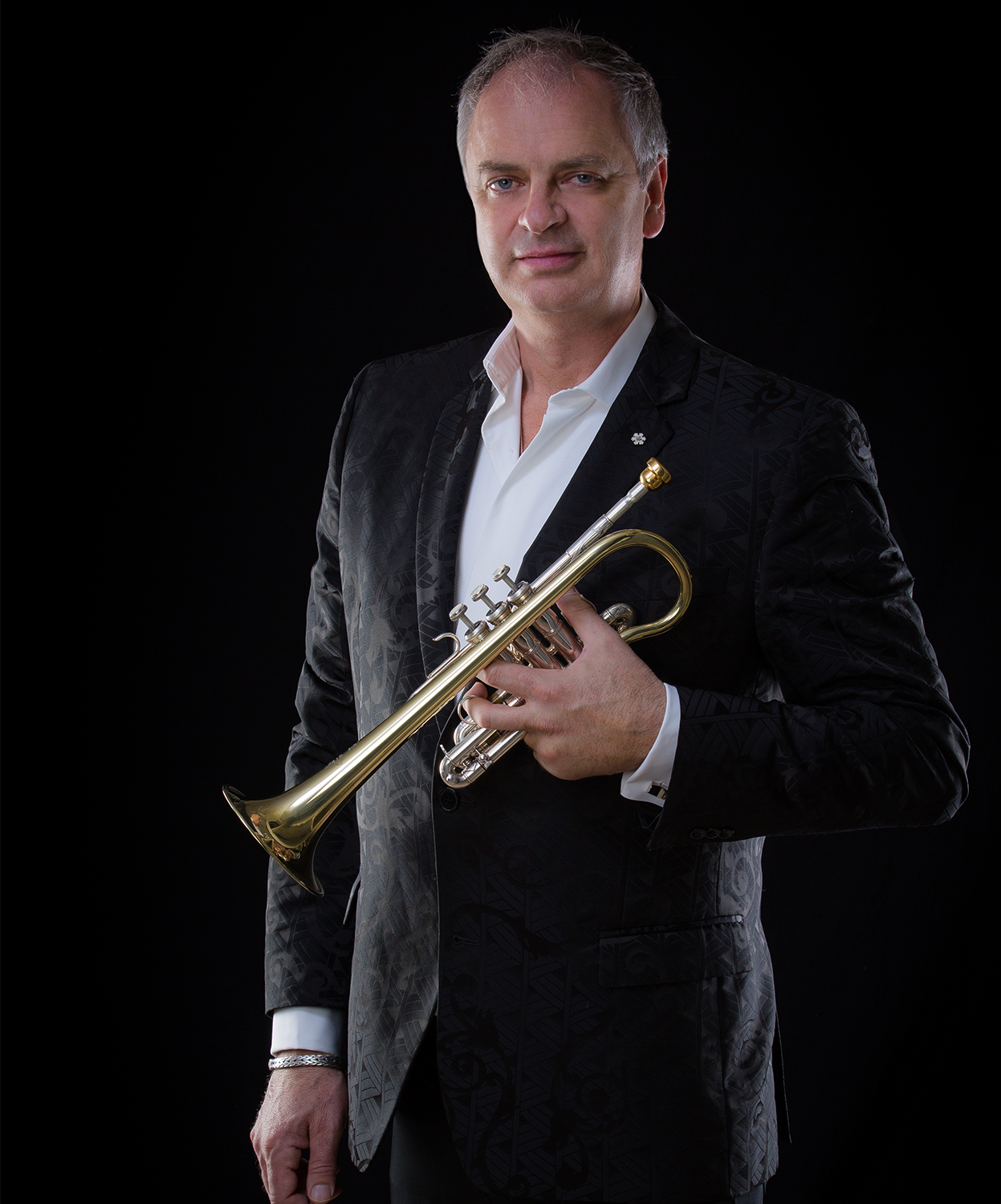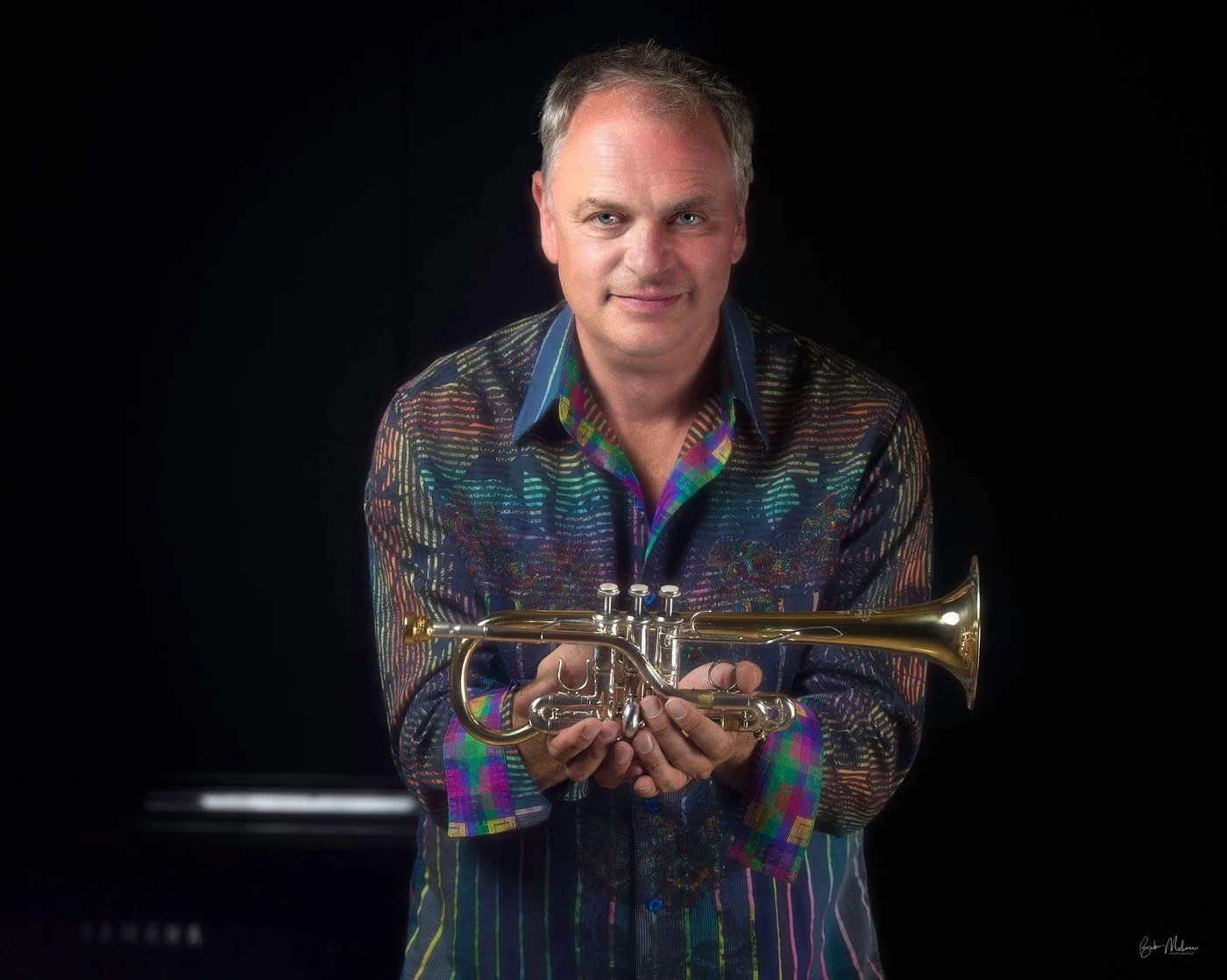From classical music to jazz, trumpeter Jens Lindemann smashes the brass instrument's stereotypes
Playing 24-karat gold-plated horns, the internationally renowned L.A.-based musician performs with Vancouver Symphony Orchestra
Jens Lindemann.
Vancouver Symphony Orchestra presents Haydn & Mozart with Jens Lindemann on January 8 at 7 pm at Bell Performing Arts Centre as part of Surrey Nights and January 9 at 2 pm at the Chan Centre for the Performing Arts as part of Classical Traditions at the Chan Centre.
FROM CARNEGIE HALL to the Great Wall of China, internationally acclaimed trumpet player Jens Lindemann has performed in places that many artists only dream of. It was a performance by trumpeter and former Tonight Show bandleader Doc Severinsen—a show he happened to go to in junior high school in Edmonton, where his family emigrated from Germany in 1967—which first planted the seed that the world stage was exactly where Lindemann wanted to be.
“He walked out on-stage wearing pink leather pants and a lime green jacket and turned to the audience and said ‘I don’t wear these pants ’cuz they look good; I’ma wear ’em because I like the way they feel,’ the Los Angeles-based musician says of Severinsen during an interview with Stir. “And he slapped himself on the butt, and he hadn’t even played a note, but the entire audience was in the palm of his hand. And I knew right at that minute that’s what I wanted to do for a living.”
Lindemann—the first classical brass soloist to ever receive the Order of Canada, a Yamaha artist who plays exclusively on 24-karat gold-plated instruments—calls Severinsen, now 94, not only a major influence on his career but also a dear friend, a true artist who instilled in him values that he embodies to this day.
“He was not only a virtuosic player of the highest order; he was a spectacular entertainer,” Lindemann says on the line from Vancouver International Airport during a stopover on his way back to California after visiting his folks in -40° Alberta. “He knew how to make the audience his own, and I think that is one of the most important lessons that every artist needs to learn, regardless of how you do it. If you can’t win over an audience, you’re missing the whole point.
“I think the most important thing when it comes to audiences is to be honest with them,” he adds. “As artists, we have a singular job, which is to make sure that the audience has a good time. In my entire career, I have never, ever met one person who has bought a ticket to a concert saying ‘I think I’m going to feel worse coming out of this concert than when I went in.’ This is the simplest thing for artists to understand. You already have them; don’t try to trick them, don’t talk to them artistically so to speak. Just share with them who you are and what you have to offer at that moment. That integrity is what makes a concert really work and provides what I call the so-called X-factor that certain artists seem to have—honesty and integrity. We’re there to share, and we need audiences to share with, and I can’t think of a more important time in history than in the middle of a COVID crisis for us to continue maintaining that mantra as artists.”
Lindemann brings his passion for performance to local audiences when he appears in two concerts with the Vancouver Symphony Orchestra. Classically trained at the Juilliard School in New York and Montreal’s McGill University, the former lead trumpet with the renowned Canadian Brass who has done a solo command performance for Her Majesty Queen Elizabeth II is as at home playing centuries-old concertos as he is jazz pop.
In fact, it’s his very aim to help do away with misconceptions about the instrument that he first picked up in junior high school, and not by choice. Anyone who wanted to play percussion in band class first had to learn trumpet or clarinet, he recalls; two weeks later, during a test of 25 students, he says he came in “dead last”. He wanted to quit, but his mother would have none of it, telling him he had to stick with it for a year before moving on. By then, he was hooked.
“The trumpet, in my opinion, is one of the most versatile, if not the most versatile, instruments in history,” says Lindemann, whose COVID-era recording with James Ehnes and Jon Kimura Parker, Bach And Brahms Re-Imagined, earned Steven Epstein a 2021 Grammy nomination for classical producer of the year. “When you start thinking of stylistic versatility of the trumpet, from baroque music to classical to romantic music to jazz to pop to funerals when it comes to things like Taps, to weddings… It literally has been involved in every different kind of musical style in western history for the past 350 years, more so than any other instrument.
“Its ability to be so diverse is one of the curiosities of it,” he says. “I feel in society we kind of take the trumpet for granted. It’s kind of there all the time. This is an instrument of incredible power and intimacy….Part of my mission is to eradicate what I call the stereotype of what people think a trumpet is. It’s very personal, but the first thing that generally comes to mind is ‘It’s a loud instrument; it’s in the back row of orchestra; it’s meant to be seen not necessarily heard very often.’ But its ability to be a very, very powerful end to a symphonic piece and to give the kind of intimacy attained with a jazz-club type of setting is why the instrument is often called the ‘king of instruments’. That’s one of the huge reasons that at every concert I do multiple styles, and I perform on multiple instruments, so people not only hear the difference but see the difference.”
Jens Lindemann.
On the program for Lindemann’s upcoming VSO concerts are Leopold Mozart’s Toy Symphony; Franz Joseph Haydn’s Trumpet Concerto; Charles Ives’s The Unanswered Question; and Allan Gilliland’s Dreaming of the Masters.
Lindemann usually walks on-stage with three or four different horns, such as a B-flat trumpet or a piccolo. When he performs the Haydn piece in Vancouver, he’ll play a one-of-a-kind E-flat trumpet that Yamaha built exclusively for him for a recording he did with Pinchas Zukerman and the Royal Philharmonic Orchestra. The composition, written in 1796, is considered “the beginning of all things trumpet”, Lindemann says.
The counterbalance to that renowned work is Dreaming of the Masters, a virtuosic jazz concerto that he premiered with the Edmonton Symphony Orchestra and that had its U.S. premiere at Carnegie Hall.
“I’ve played it all over the world,” Lindemann says. “It’s a spectacular concerto specifically designed to pay homage to masters of the trumpet—not specific players but the idea of blues, swing, modern contemporary fluglehorn playing, of intimate jazz-style playing, and finally, Latin salsa—very, very hot Latin salsa. We wrap this all up in a 16-minute concerto to show the scope of what the instrument is capable of, how much influence it’s had in musical society for as long as any of us can remember. The audience is going to get a complete meal of what the trumpet is capable of.”
And yes, audiences will see what horns plated with 24-karat gold look and sound like; some Lindemann has had painted different colours. He concedes that part of the reason for the use of the precious metal is pure marketing gold, but there’s more to it than that. “In order to gold plate an instrument, you have to plate it on top of silver plate, and it allows the instrument to vibrate differently and especially warmly,” Lindemann explains. “It gives this warm, beautiful sound for audiences as opposed to anything that feels shrieky.”
Lindemann notes that he may end up conducting Ives’ piece, giving VSO principal trumpet Larry Knopp a chance to shine. He and Knopp go way back, having grown up together and attended many band camps in Alberta together. “You have one of the greatest principal trumpet players in the world in Vancouver,” he says.
Before he heads to the gate to catch his flight to L.A., Lindemann volunteers that he has decided to bring the concert to a close with a very special encore: Oscar Peterson’s “Hymn to Freedom”.
“It’s one of the most powerful pieces of music I’ve ever played, and its message to society especially right now couldn’t be more timely,” Lindemann says. “It’s such a powerful piece of music at any time, and the effect it has on concerts is indescribable. I decided, especially in this time of COVID, that we want to close with something really forward-thinking and hopeful in nature.
“I don’t want to go back to the way we thought of concerts pre-COVID,” he adds. “Now more than ever, we’ve been so selective and so grateful that we have live performance, my mantra is I’m really not going to underestimate or not appreciate another performance again in my life. I don’t want to go back to pre-COVID way of thinking, which was hustle, hustle, hustle. This is different.”
For more information, see Vancouver Symphony Orchestra.














